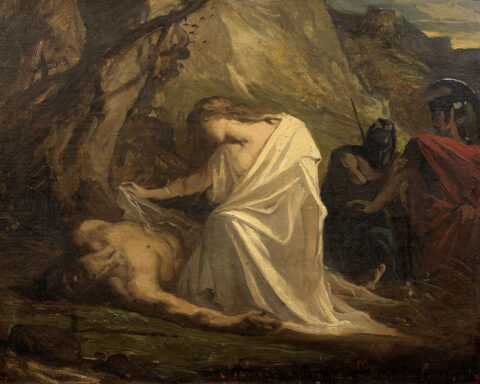“When I die, they will bury me there,” Mateo says casually.
The statement stuns me into momentary silence as I follow the path of his gaze, landing on a far-off mount eastward from the hilltop we’re standing on, the highest elevation for several miles in every direction. Cabuya Island, he calls it. Despite being gangly-armed and legged with the swarthiness of an adolescent sailor, Mateo has a fluency in Mesoamerican survival that grants him the gravitas of someone older. Earlier that day, I had seen him scale a sixty-foot coconut tree bare-limbed before tossing one of the hollow yellow fruits into the sand.
He is talkative enough for a guide, in addition to his brisk familiarity, a quality that likely earns him points with the eco-tourists. In the space of a half-day, some requisite small talk reveals enough personal detail: he grew up in Montezuma, he has his sights on a local girl named Luciana, and he plans to never leave this beach town. We use these highlights and their spin-offs to pass the time walking over from the bungalow to the waterfalls with their well-marked trails to this hill, where few hikers venture.
“I have to surf every day,” he tells me, his face serious. “One time, I got stuck in the ocean.” He makes a motion with his hands, pushing them upward like high waves.
Mateo points ahead, toward a dark opening in the thicket of overlapped trees.
“Por acá.”
“Through there?” I ask, unmistakable nervousness creeping into my voice.
“Claro. Pura vida,” he says with a half-shrug. “Just follow me.”
He moves much faster than I expect, dashing through with the speed of an eddying stream. There are no well-constructed rope bridges or paved stairs. The ground is knotted with roots and I can barely take a step without disturbing the silk cobwebs spun in long gossamers or their inhabitants. Somehow Mateo avoids these. Pausing for even a brief second feels precarious, as though something worse than arachnids will emerge from the dim crevices of tangling brambles and gorse and ensnare me into its clutches. Navigating this free-form maze renders me infantile, and I focus on the safety of putting one foot in front of the other before panic can settle in. Back to basics. Mateo must have taken this path or something like it, unbeaten to my eyes, hundreds of times.
He continues weaving ahead, calling out the occasional “Todo bien?” without a backward glance. I wonder if I actually say something, if he would turn back. He has to, but then, the rules are different here. Everything back home in the states requires paperwork, waivers, and written consent. Lawyers with bar certifications and letters trailing their names. What rules existed here? Survive and keep surviving.
Eventually I reach the end of the branches where the light filters in from outside. Mateo is standing, facing in the direction of the bungalow, where the beach is and the waves frolic and foam. A few tourists led by guides are in the shallows, trying to regain bipedal balance on longboards. I’m panting my question next.
“What happened? After you were stuck out there?”
Mateo squints and then his brow relaxes. “Oh, some whales found me. They carried me to an inlet.” I look for any sign of sarcasm and don’t find it. His responses are direct, daring you to wonder. He doesn’t ask me anything in return. This offering is as vast as those of this coastline country, sun-ripened and supple. An evening bonfire that crackles into salty air. Sea turtle hatchlings that poke their way into existence, placing their trust in the depths of the Pacific Ocean. Replete as the land itself, I am swallowed up by its generosity.



